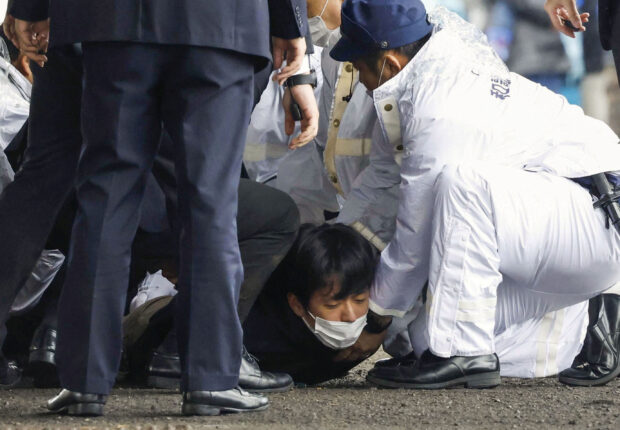
A man, believed to be a suspect who threw a pipe-like object near Japanese Prime Minister Fumio Kishida during his outdoor speech, is held by police officers at Saikazaki fishing port in Wakayama, Wakayama Prefecture, south-western Japan April 15, 2023, in this photo released by Kyodo. Mandatory credit Kyodo via REUTERS
TOKYO, Japan — Suspected gunpowder has been found at the home of a man accused of throwing an explosive at Japan’s Prime Minister Fumio Kishida during a campaign event, local media said Monday.
Kishida was unharmed in the attack, in which a suspected pipe bomb was tossed towards him at a port in western Japan’s Wakayama, shortly before he gave a speech.
Police spent over eight hours on Sunday searching the home of the man, who has been named as 24-year-old Ryuji Kimura, and local residents were temporarily evacuated over the threat of explosives.
Wakayama police declined to comment on the reports.
National broadcaster NHK said suspected gunpowder, as well as pipe-like objects and tools were found at the home, and investigators now believe the explosive thrown at the event was homemade.
They are analyzing Kimura’s phone and computer for clues, but he has so far refused to detail any motive in the attack.
He was transferred on Monday to the Wakayama prosecutors’ office from a local police station, local media reported. The prosecutors’ office declined to comment.
Police officers investigate Saikazaki port, where Japan’s Prime Minister Fumio Kishida was evacuated unharmed from the scene of an apparent “smoke bomb” blast a day before, in Wakayama on April 16, 2023. (Photo by JIJI PRESS / AFP) / Japan OUT
NHK aired footage showing him sitting in the rear seat of a police car looking straight ahead as he was moved.
He is currently under arrest on suspicion of obstruction of business.
The attack came less than a year after the assassination of former prime minister Shinzo Abe, which traumatized Japan and forced a security shake-up for public officials.
And it happened as climate and energy ministers from the Group of Seven countries met in the northern city of Sapporo, and a day before the bloc’s foreign ministers arrived in the resort town of Karuizawa for talks.
Top government spokesman Hirokazu Matsuno said Monday that the police agency had “instructed police across the country to strengthen security, which was immediately implemented”.
Officers were ordered to “strengthen patrolling and guarding, including security for the G7 Hiroshima summit”, Matsuno said.
RELATED STORIES
Japan PM safe after ‘smoke bomb’ at speech
Japan PM resumes campaigning after blast incident